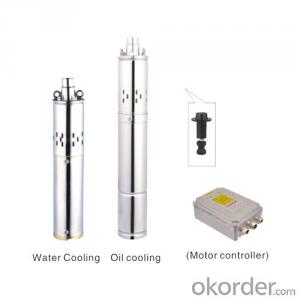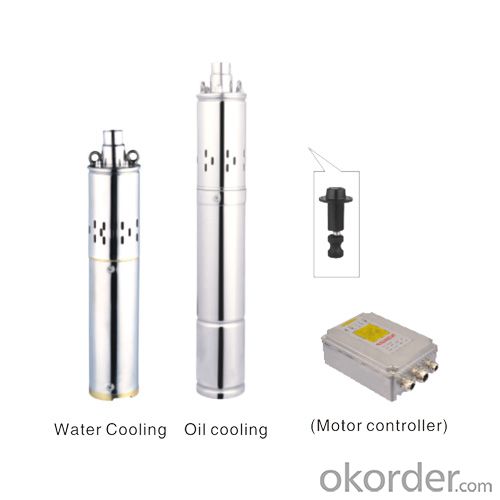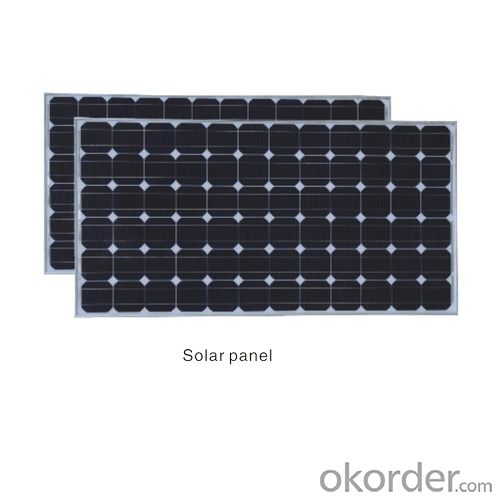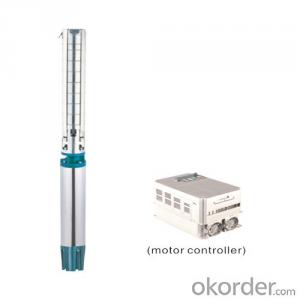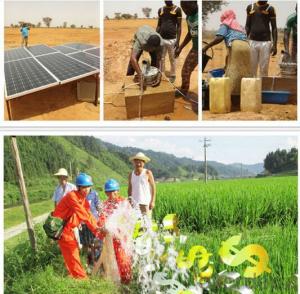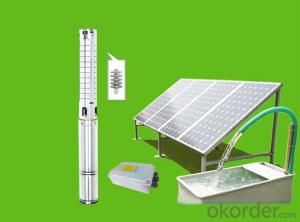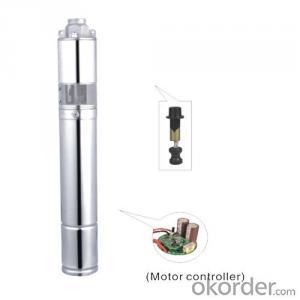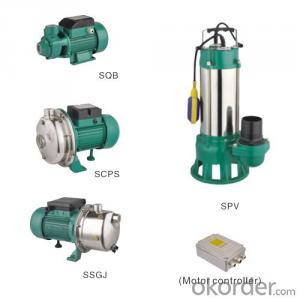Garden Fountain Solar Pump 4sps Easy Install Well Pumps with CE Certification
- Loading Port:
- Ningbo
- Payment Terms:
- TT OR LC
- Min Order Qty:
- 10 unit
- Supply Capability:
- 100000 unit/month
OKorder Service Pledge
OKorder Financial Service
You Might Also Like
Specifications
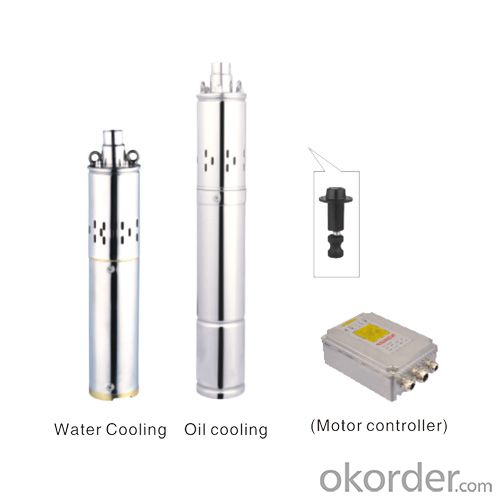
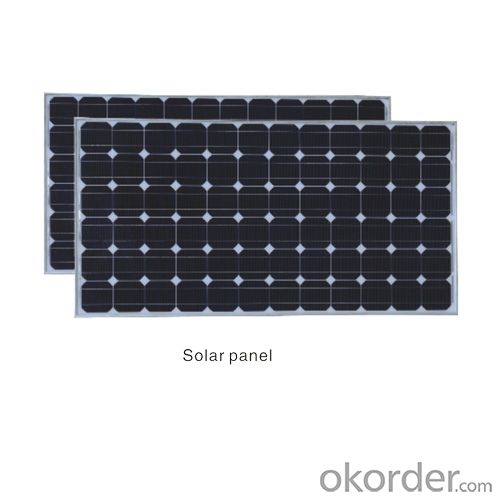
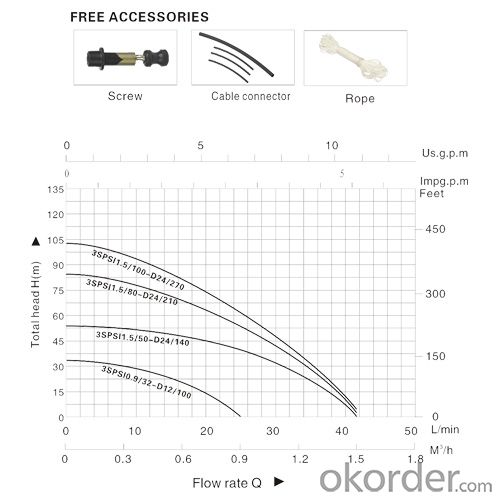
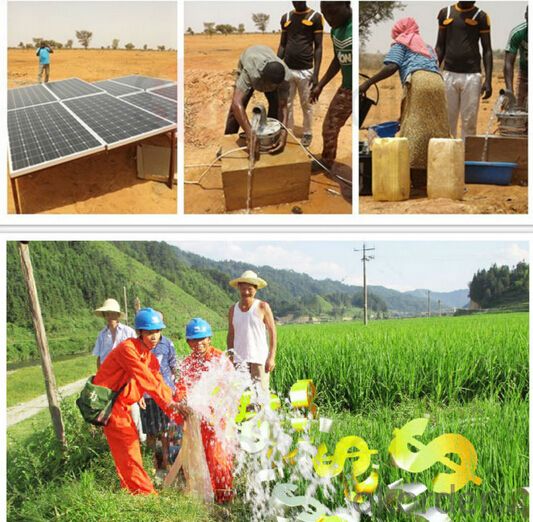
•Profile:
Adopt stainless steel screw and rubber stator, permanent Magnet Brushless motor. With combination of motor and controller, the max efficiency is over 85%, raises 25% than the traditional AC one.
•Material:
1)Stainless steel casing, shaft core, coupling and pump body; copper alloy connecting, base; rubber stator of high-strength and wear-resistant.
2)Water immersion style stainless steel submersible motor; graphite bearings.
•Product Feature:
1)Compact structure, high-lift, noiseless, pollution-free; complete electrical protecting controller device, against under-voltage, over-voltage, over-flow, overload, waterless etc; automatic recovery; controlling water height as demand.
2)Easy installation, maintenance-free, safe and reliable.
Water depth: 1 -150m Max flow: 4.2m3/h
•Application:
1) These electric pumps series are workable with in maximum head, as there are no restrictions of BDC. With the addition of high head, high efficiency and wide high efficiency zone, they are suitable for distance water irrigation, high efficiency of increasing oxygen on aquaculture, pumping water from deep well, gardening, fountain and etc.
•Working condition:
1)Non-corrosive water; the volume ratio of sand content no more than 1%o particle size less than 0.2mm.
2)Max medium temperature up to +40t); PH value remains 6.5-8.5.
3)Work close to the rated head and must be immersed in water.
.Motor Data
MODEL | Voltage | Power | Max.head (m) | Max.flow (mVh) | OUTLET | GW | Dimension |
4SPS2.5/50-D24/270 | 18-36 | 180-360 | 50 | 2.5 | G1.2 5" | 95 | 100 |
4SPS3/60-D36/500 | 24-48 | 300-700 | 60 | 3 | G1. 2 5" | 10 | 100 |
4SPS3.6/80-D48/750 | 36-72 | 450-1000 | 80 | 3.6 | G1.2 5" | 10.3 | 100 |
4SPS4/1 00-D72/1 000 | 48-96 | 600-1300 | 100 | 4 | G 1. 2 5" | 10.5 | 100 |
4SPS3/1 20-D72/1 000 | 48-96 | 600-1300 | 120 | 3 | G1. 2 5" | 11 | 100 |
Product Description
Product Feature
Solar submersible pumps is the efficient equipment to extract groundwater in applications of agricultural irrigation, human and livestock water in plateau and mountain areas, etc.
1. Motor and shell made of stainless steel
2. Stainless steel shaft and coupling
3. High strength & wear resistance stainless steel impeller and diversion shell
4. Sand resistance, anti-rust, pollution-free, long life time
5. Small size, light and easy to ship
6. Easy installation and easy maintain
7. High efficient smart controller with multiple protections: over-temperature protection,
short-current protection, over-load and under-voltage protection. Safe and reliable to use.
Price includes pump with controller. Solar PV panels may be purchased separately.
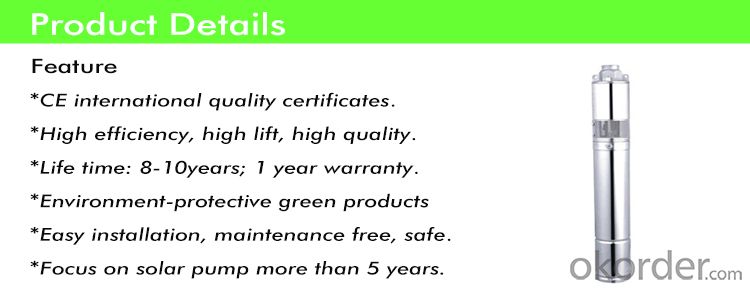
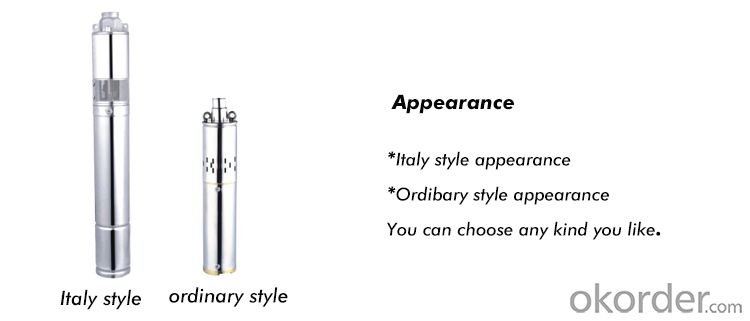




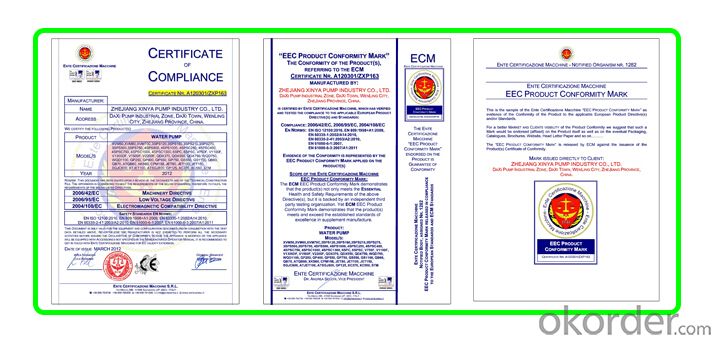
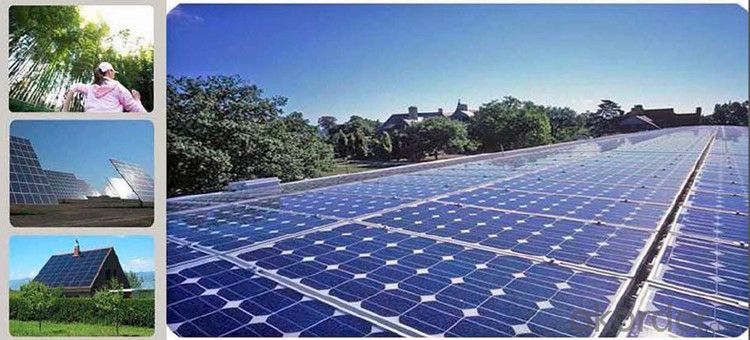
CNBMSOLAR is a world-leading and Vertical integrated manufacturer of high-performance with Silicon, Wafer, Cells,
Modules, which convert sunlight into electricity for residential, commercial, and utility-scale power generation.
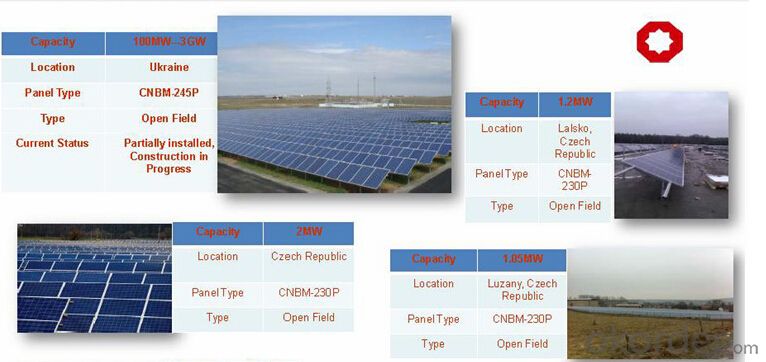
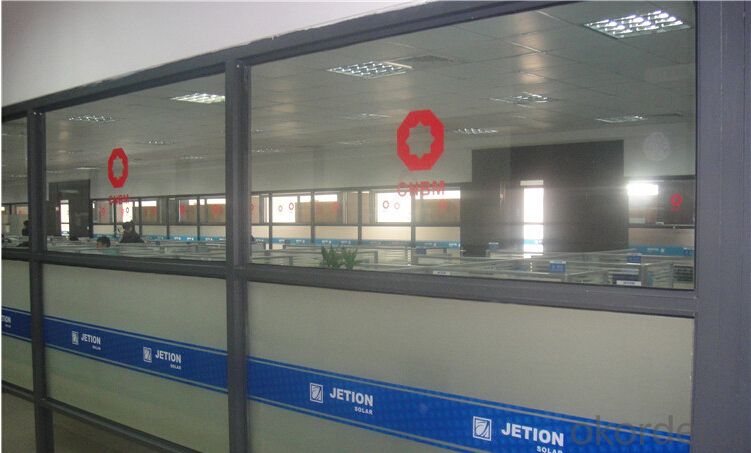
FAQ
Q1. When can I get the quotation?
We usually quote within 24 hours after we get your inquiry. If you are urgent to get the price, please send the message on trade manager or call us directly.
Q2. Can I buy one as sample?
Yes, of course. MOQ of solar pump is 1 piece. For the other kind of products (water pump, air compressor and welding machine), you need to pay all the fee when we make the sample.
Q3. Can you make OEM?
Yes, you can put your logo and brand on the box.
Q4. What is your main market?
Eastern Europe, Southeast Asia. Mid East, South America, Northern Europe.
- Q: Can a solar pump be used for both irrigation and drinking water purposes?
- Yes, a solar pump can be used for both irrigation and drinking water purposes. Solar pumps are designed to draw water from a source, such as a well or a river, using solar energy instead of traditional power sources. The water can then be used for various purposes, including irrigation for agricultural fields and gardens, as well as for drinking water purposes. However, it is important to note that the water should be properly treated and filtered before it is used for drinking to ensure its safety and to remove any impurities. Additionally, the capacity and specifications of the solar pump should be considered to determine if it can meet the required water demands for both irrigation and drinking water purposes.
- Q: How does the installation complexity of a solar pump compare to a traditional electric pump?
- The installation complexity of a solar pump is generally lower compared to a traditional electric pump. This is because a solar pump relies on the power of the sun to operate, eliminating the need for extensive electrical wiring and infrastructure. Additionally, solar pumps are often designed to be easily installed and maintained, requiring less technical expertise. Therefore, the installation process for a solar pump is usually simpler and more straightforward than that of a traditional electric pump.
- Q: How much power does a solar pump require?
- The power required for a solar pump depends on various factors such as the desired flow rate, head pressure, efficiency of the pump, and available sunlight. Generally, a solar pump can range from a few watts to several kilowatts.
- Q: Are there any restrictions on the type of piping that can be used with a solar pump system?
- Yes, there are some restrictions on the type of piping that can be used with a solar pump system. The choice of piping material should be made considering factors such as the type of fluid being pumped, the size of the system, the pressure requirements, and the environment in which the system will be installed. For small-scale solar pump systems, such as those used for residential applications, commonly used piping materials include polyethylene (PE) and polyvinyl chloride (PVC). These materials are lightweight, cost-effective, and easy to install. However, they may not be suitable for high-pressure applications or when pumping corrosive fluids. In larger-scale systems or when higher pressures are required, materials like stainless steel, copper, or galvanized steel may be used. These materials offer better durability and higher pressure resistance. Stainless steel is particularly suitable for corrosive environments, while copper pipes are commonly used in systems with higher heat transfer requirements. It is also important to consider the diameter of the piping. The diameter should be selected based on the flow rate and pressure requirements of the solar pump system. Using an undersized pipe can result in pressure losses and reduced system efficiency, while an oversized pipe can increase the cost of the installation unnecessarily. Additionally, it is important to ensure that the piping is properly insulated to prevent heat loss or gain, especially in systems that involve transferring heat from solar collectors to a storage tank or heat exchanger. Overall, the choice of piping for a solar pump system should be based on factors such as fluid type, system size, pressure requirements, environmental conditions, and cost considerations. It is advisable to consult with a professional or refer to the manufacturer's guidelines to select the most appropriate piping material and size for a specific solar pump system.
- Q: Are solar pumps weatherproof?
- Yes, solar pumps are typically designed to be weatherproof. They are built to withstand various weather conditions such as rain, snow, and extreme temperatures. However, it is always recommended to check the specifications and manufacturer guidelines for specific models to ensure their weatherproof capabilities.
- Q: Can a solar pump be used for groundwater extraction?
- Yes, a solar pump can be used for groundwater extraction. Solar pumps are designed to harness energy from the sun and convert it into mechanical energy to pump water from underground sources such as wells or boreholes. These pumps are environmentally friendly, cost-effective, and can be used in remote areas where electricity supply is limited or unavailable.
- Q: How does the maintenance cost of a solar pump system compare to a traditional electric pump?
- The maintenance cost of a solar pump system is generally lower compared to a traditional electric pump. This is primarily due to the fact that solar pumps have fewer moving parts and no complex electrical systems, which reduces the risk of mechanical failure and the need for extensive maintenance. Solar pumps are powered by solar panels, which have a long lifespan and require minimal maintenance. The main maintenance tasks for a solar pump system involve checking and cleaning the solar panels regularly to ensure optimal performance. Additionally, the pump itself may require occasional maintenance such as lubrication and inspection of connections. In contrast, traditional electric pumps require more regular maintenance due to the complexity of their electrical systems and moving parts. Electric pumps often have motors, wiring, and other components that can wear out over time and require maintenance or replacement. The electrical connections also need to be regularly inspected and maintained to prevent any potential issues. Furthermore, traditional electric pumps are typically connected to the grid, which means they are subject to fluctuations in electricity prices. This can result in higher operational costs compared to solar pumps, which rely on the sun's energy and do not incur any ongoing electricity expenses. Overall, while both solar pump systems and traditional electric pumps require maintenance, the maintenance cost of a solar pump system tends to be lower due to the simpler design, fewer moving parts, and reduced reliance on external sources of power.
- Q: How does a solar pump handle water with high levels of turbidity or suspended solids?
- A solar pump is not typically designed to handle water with high levels of turbidity or suspended solids. These pumps are more effective in clear water conditions, as the presence of solids can lead to clogging or damage to the pump. In situations where water has high turbidity or suspended solids, alternative water treatment methods such as filtration or settling may be necessary before using a solar pump.
- Q: Can a solar pump be used for water supply in community gardens or urban farming projects?
- Yes, a solar pump can be used for water supply in community gardens or urban farming projects. Solar pumps are a sustainable and environmentally friendly solution as they utilize the energy from the sun to pump water. They are ideal for remote locations with limited access to electricity and can efficiently provide water for irrigation and other agricultural needs. Additionally, solar pumps require minimal maintenance and operating costs, making them a practical choice for community gardens and urban farming projects.
- Q: How does a solar pump handle water with high levels of nitrates or other contaminants?
- A solar pump does not have the capability to handle water with high levels of nitrates or other contaminants. It is primarily designed to pump water for irrigation or drinking purposes, and it does not have built-in filtration or purification systems. In such cases, additional water treatment methods like reverse osmosis or activated carbon filters may be required to remove contaminants before using the water pumped by a solar pump.
Send your message to us
Garden Fountain Solar Pump 4sps Easy Install Well Pumps with CE Certification
- Loading Port:
- Ningbo
- Payment Terms:
- TT OR LC
- Min Order Qty:
- 10 unit
- Supply Capability:
- 100000 unit/month
OKorder Service Pledge
OKorder Financial Service
Similar products
Hot products
Hot Searches
Related keywords
